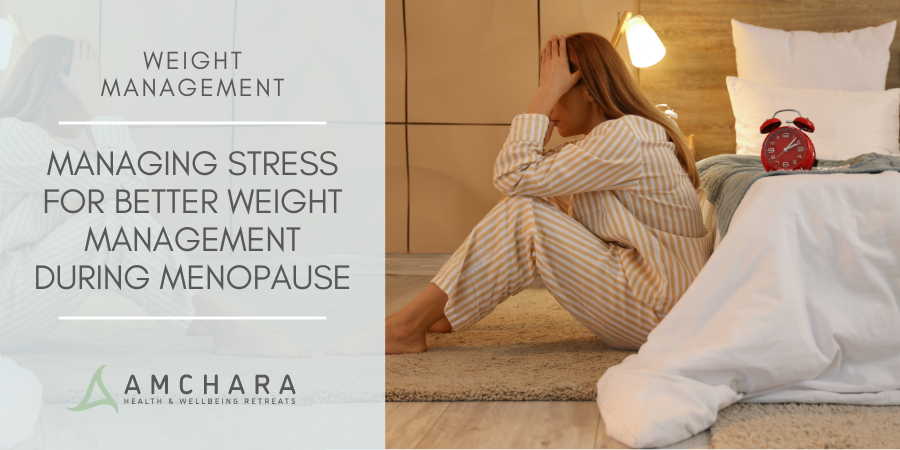As women enter menopause, a range of physiological changes occur that can lead to weight gain. One of the most significant, but typically overlooked factors in menopausal weight gain, is stress – and the surge of hormones, such as cortisol, that contribute to increased stress levels.
Understanding how stress interacts with menopause is crucial to addressing weight management. Studies associate higher stress levels during the transitional time of menopause. This can be attributed to a variety of factors, including challenging menopausal symptoms. Also, menopause often overlaps with the “sandwich generation” years, where women are caring for both ageing parents and growing children, making it more challenging to find time for self-care.
Our articles are always evidence-based and oriented to a Personalised Health approach, and we aim to provide you with actionable knowledge and tips to help you on your journey to optimal health.
In this article, we’ll explore how stress hormones, especially cortisol, contribute to weight gain, why excessive exercise may make matters worse, and look at seven strategies you can use to reduce stress, improve your wellbeing and help better manage your weight during this transition.
How hormones affect weight gain in menopause
Declining oestrogen levels contribute to a shift in body fat storage, with more fat being distributed around the abdomen, as well as making the body more sensitive to cortisol. At the same time as decreasing oestrogen, levels of another hormone, androgen, typically rise, causing an hormonal imbalance that can contribute to weight gain.
Typically lower progesterone levels can contribute to water retention and bloating, as well as negatively impacting mood and anxiety – because progesterone exerts a calming effect on the brain.
Testosterone levels also fall which can lead to decreased muscle mass, and reduce energy levels, increasing lethargy, and so potentially impacting motivation to exercise.
Cortisol, often called the ‘stress hormone’, is produced by the adrenal glands in response to stress, whether emotional or physical. While it’s a necessary hormone for survival, prolonged and elevated levels of cortisol can lead to a cascade of health problems, including weight gain.
These hormonal fluctuations can result in menopausal women experiencing heightened stress responses, leading to chronically high cortisol levels, which in turn:
Why exercise alone won’t help
It’s a common belief that ramping up exercise can counteract weight gain. However, during menopause, intense or excessive exercise can sometimes have the opposite effect. Over-exercising can be a physical stressor on your body, causing cortisol levels to spike even further.
This can make it more difficult to lose weight or even maintain current weight levels.
Excessive exercise during menopause may cause:
So, while exercise is essential for health and weight management, it’s important to strike a balance that prevents stress from becoming a detriment rather than a benefit.
7 effective strategies to reduce stress and prevent weight gain
Reducing stress not only helps you feel better emotionally but also helps balance your hormones, particularly cortisol, and can prevent or reverse stress-related weight gain.
Here are seven proven strategies to help you learn how to manage and reduce stress effectively during menopause:
Takeaway
Menopause is a time of significant change, and the impact of stress on weight gain can be a challenging aspect to manage. High cortisol levels triggered by chronic stress promote fat storage, increase cravings, and slow your metabolism – all of which can lead to weight gain, particularly in the midsection.
The good news is that stress management lifestyle techniques like mindful movement, proper sleep, meditation, and a balanced diet can go a long way in helping to reduce cortisol levels and helping with weight control. By prioritising stress reduction, you can take control of your health, feel better emotionally, and make it easier to manage your weight during menopause.
It’s important to remember that excessive exercise, far from solving the problem, can actually increase cortisol and make weight loss harder. Finding balance in both your exercise and stress management routines is key to achieving long-term health and wellbeing during the menopause.
If you are looking for support to optimise your health on your menopause journey, you could benefit from a retreat at Amchara. Come to one of our beautiful detox health retreats, designed to help you detoxify both physically and mentally – either in the tranquil English countryside or on the beautiful Mediterranean island of Gozo.
We passionately provide personalised detox and wellness programmes for lasting health improvements. Our expert team, including naturopaths and nutritionists, lead diverse programmes for weight management, gut health, and stress relief.
Our Personalised Health practitioners will support you through your menopause journey, recommending positive, sustainable lifestyle choices tailored to your individual health circumstances and goals.
At Amchara, you will be immersed in a supportive and nurturing environment, combining a Functional Medicine and naturopathy approach, that enables you to switch off, relax and kickstart your health journey, and Change for Good.




